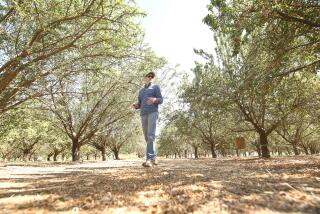U.S. Studies New Option in War on Drugs--Insects : Latin America: Thousands of white moths may be released to devour coca plants.
- Share via
WASHINGTON — After years of despair over South America’s burgeoning coca crop, the Bush Administration is studying a new option in the Latin drug war: unleashing swarms of tiny insects into the jungles of Peru and Bolivia to devour the shrubs that are the raw material for cocaine.
At the urging of national drug control director William J. Bennett, the Administration recently more than quadrupled, to $6.5 million, the budget for a secretive Agriculture Department research program to develop chemical and biological agents for the destruction of drug crops.
Officials said the funds will be used for a variety of exotic projects, including testing a red dye that kills marijuana plants and a soil fungus that wipes out coca. But the principal focus of the stepped-up effort is the malumbia, a white moth that, in its caterpillar stage, gobbles the green leaves of the coca plant.
Since the inch-long malumbia is an indigenous pest of the coca plant, growers in Peru’s Upper Huallaga Valley--the source of more than half of the world’s cocaine--are already dousing their crops with large quantities of malumbia-killing insecticides, U.S. officials say. But researchers believe that if they can breed the insect in mass quantities, hundreds of millions of malumbia eggs or caterpillars can then be air dropped over the coca-growing regions and the growers’ efforts will be thwarted.
“It looks promising,” said Waldemar Klassen, associate deputy administrator for the Agricultural Research Service, who oversees the project. “This is quite a voracious caterpillar. . . . If we could put them down there in sufficient numbers, we could then defoliate the plants.”
Klassen contends that the mass breeding of malumbias poses such a menace to drug cartels that the Agriculture Department has decided to keep most details of the project under wraps. No public disclosure of the project has been made, and security at the agriculture service’s research labs has been intensified.
“This is a very sensitive undertaking--people get killed doing this kind of work,” said Klassen.
But U.S. officials acknowledged last week that the secrecy has as much to do with international politics as with the safety of the researchers. One senior anti-drug official familiar with the project said he was reluctant to talk about it for fear of riling Latin political sensitivities. “This is the kind of thing that drives the Andean countries crazy,” said the official.
More to Read
Sign up for Essential California
The most important California stories and recommendations in your inbox every morning.
You may occasionally receive promotional content from the Los Angeles Times.













